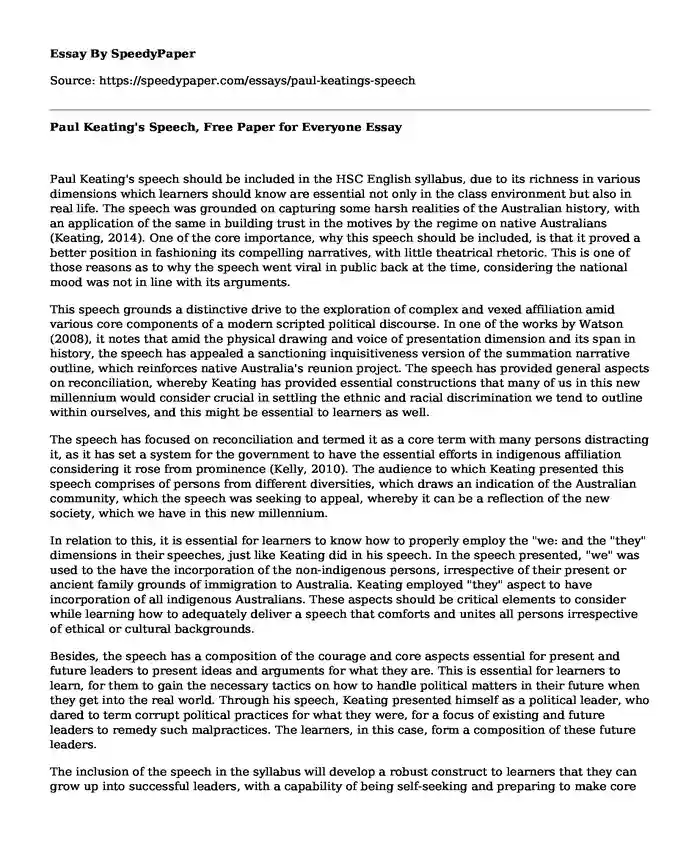Paul Keating's speech should be included in the HSC English syllabus, due to its richness in various dimensions which learners should know are essential not only in the class environment but also in real life. The speech was grounded on capturing some harsh realities of the Australian history, with an application of the same in building trust in the motives by the regime on native Australians (Keating, 2014). One of the core importance, why this speech should be included, is that it proved a better position in fashioning its compelling narratives, with little theatrical rhetoric. This is one of those reasons as to why the speech went viral in public back at the time, considering the national mood was not in line with its arguments.
This speech grounds a distinctive drive to the exploration of complex and vexed affiliation amid various core components of a modern scripted political discourse. In one of the works by Watson (2008), it notes that amid the physical drawing and voice of presentation dimension and its span in history, the speech has appealed a sanctioning inquisitiveness version of the summation narrative outline, which reinforces native Australia's reunion project. The speech has provided general aspects on reconciliation, whereby Keating has provided essential constructions that many of us in this new millennium would consider crucial in settling the ethnic and racial discrimination we tend to outline within ourselves, and this might be essential to learners as well.
The speech has focused on reconciliation and termed it as a core term with many persons distracting it, as it has set a system for the government to have the essential efforts in indigenous affiliation considering it rose from prominence (Kelly, 2010). The audience to which Keating presented this speech comprises of persons from different diversities, which draws an indication of the Australian community, which the speech was seeking to appeal, whereby it can be a reflection of the new society, which we have in this new millennium.
In relation to this, it is essential for learners to know how to properly employ the "we: and the "they" dimensions in their speeches, just like Keating did in his speech. In the speech presented, "we" was used to the have the incorporation of the non-indigenous persons, irrespective of their present or ancient family grounds of immigration to Australia. Keating employed "they" aspect to have incorporation of all indigenous Australians. These aspects should be critical elements to consider while learning how to adequately deliver a speech that comforts and unites all persons irrespective of ethical or cultural backgrounds.
Besides, the speech has a composition of the courage and core aspects essential for present and future leaders to present ideas and arguments for what they are. This is essential for learners to learn, for them to gain the necessary tactics on how to handle political matters in their future when they get into the real world. Through his speech, Keating presented himself as a political leader, who dared to term corrupt political practices for what they were, for a focus of existing and future leaders to remedy such malpractices. The learners, in this case, form a composition of these future leaders.
The inclusion of the speech in the syllabus will develop a robust construct to learners that they can grow up into successful leaders, with a capability of being self-seeking and preparing to make core revolutions for the betterment of the society. Though Anwar Sadat's speech is a good one as long as leadership and political dimensions are concerned, Keating's speech has more profound presentations and arguments, which are essential for learners in building their careers. Keating's speech is also famous as it has with it a display of the various aspects to consider when outlining a speech to the masses, and learners should learn such elements for them to employ them later on in life.
References
Keating, P. (2014). After words: The post-prime ministerial speeches. Sydney.
Kelly, P. (2010). The march of patriots: The struggle for modern Australia. Carlton, Victoria: Melbourne University Press.
Watson, D. (2008). Recollections of a bleeding heart: A portrait of Paul Keating PM. North Sydney, N.S.W: Vintage, a division of Random House.
Cite this page
Paul Keating's Speech, Free Paper for Everyone. (2022, Jun 27). Retrieved from https://speedypaper.com/essays/paul-keatings-speech
Request Removal
If you are the original author of this essay and no longer wish to have it published on the SpeedyPaper website, please click below to request its removal:
- Free Essay Example on Environmental Health Justice
- Metrics of Assessing Success - Free Essay in Management
- Essay Example: Aid Organization Report
- Essay Sample with the Published Experimental Design Checklist Comparison
- The Polish Culture Essay Sample
- Essay Sample. Post-Civil War America
- Essay Example on Application of Statistics in Health Care
Popular categories





